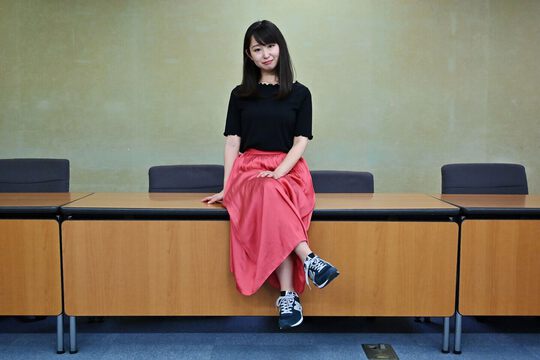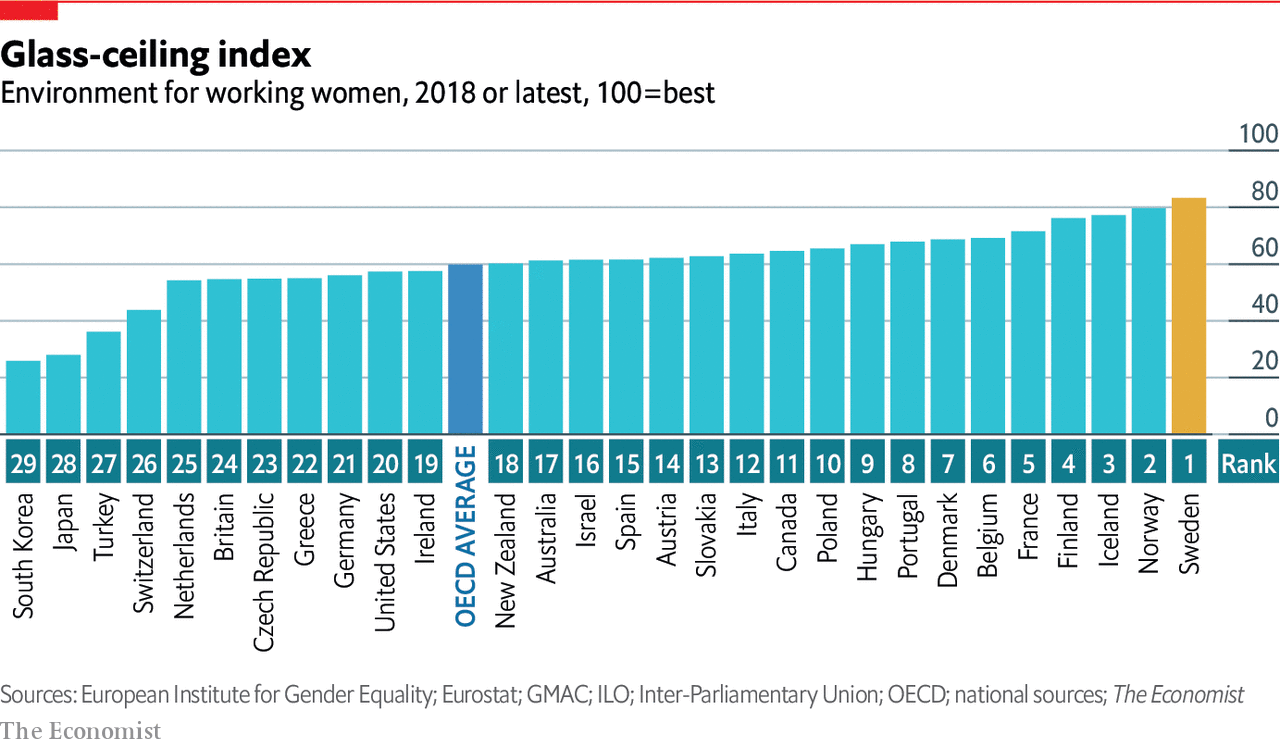
本期经济学人杂志【亚洲】板块下这篇题为《Heels at high water: Japanese women rebel against painful dress codes》的文章关注的是日本企业对女性严厉古板的职业装要求让她们感到痛苦,一些女性站出来发起 #KuToo 运动抗议被迫穿痛苦的职业装。
衡量女性平等度的经济学人杂志“玻璃天花板指数”显示,在 29 个富裕国家中日本女性平等度很低,列倒数第二(下图)。
有调查显示,超过 60% 的日本职场女性自己或目睹同事被迫穿高跟鞋,有些甚至要求鞋跟高 5 公分。许多日企对女性外表的要求严格且死板,有的企业不允许女性员工佩戴有形眼镜,认为这有损形象,这一规定对那些佩戴隐形眼镜不舒服的女性员工尤其不合理。

即使穿高跟鞋等严格的着装会使女性感觉痛苦,但日本女性总是被要求遵守公司着装要求。但有位名叫 Yumi Ishikawa 的日本女子发起了反对穿高跟鞋的 #KuToo 运动(注一),并发起请愿希望政府禁止企业要求女性员工穿高跟鞋。目前日本政府尚未对此做出正式回应。
但一些日本企业逐渐对 #KuToo 运动做出了回应。3 月底,日本航空公司宣布将采用的新制服,允许女性空乘人员不穿高跟鞋和短裙,引入裤装制服等。日本三大手机运营商也都放宽了对高跟鞋的规定。
注一: #KuToo:ku 在日语中有双关含义,“鞋子” (kutsu 靴) 和“痛苦” (kutsuu 苦痛)。

Japanese women rebel against painful dress codes
Heels at high water
Japanese women rebel against painful dress codes
Some employers care more about how they look than how they feel
Asia
Apr 8th 2020 edition
Apr 8th 2020
TOKYO
ISHIKAWA YUMI worked eight-hour shifts as an usher in a funeral parlour, always in heels. Her employer insisted. Her toes bled. “Why do we have to hurt our feet at work, when men can wear flat shoes?” she complained on Twitter. The tweet exploded.
Encouraged, she gathered 18,800 signatures on a petition calling for a ban on employers requiring women to wear high heels, which she submitted to the government last June. Ms Ishikawa became the face of the #KuToo campaign—a pun on Japanese words for shoes (kutsu) and pain (kutsuu), with a nod to the #MeToo movement.
More than 60% of Japanese women with jobs have been forced to squeeze their feet into heels at work or have witnessed colleagues having to, according to a survey. Female staff at Takashimaya, a department store, must parade around the shop in 5cm heels. The former defence minister, Inada Tomomi, felt obliged to totter about in heels even on the deck of a visiting American aircraft carrier.
Dress codes at many Japanese firms are rigid. Some ban glasses for women (but not men), on the grounds that they are unflattering. This is especially unreasonable for those who find contact lenses uncomfortable. “Women have always been told to follow the dress code, even if it causes pain,” says Ms Ishikawa. Japanese bosses, who tend to be older men, often expect their female underlings to gaman (endure it).
The government has dug in its heels. A former labour minister, who received Ms Ishikawa’s petition last year, insists that wearing high heels at work is “necessary and appropriate”. The petition itself has received no official response to date. Japan ranks the second lowest out of the 29 rich countries in The Economist’s glass-ceiling index, which measures equality for women in the workplace.
But corporate Japan is slowly responding to #KuToo. In late March Japan Airlines announced that its female flight attendants can kick off their heels and swap skirts for trousers if they choose. All three big mobile-phone operators have relaxed their rules on heels. Ms Ishikawa is collaborating with a shoe company to produce chic heel-less shoes. “Society is changing,” says Ms Ishikawa. “We can’t be ignored.” Pointless rules about footwear may soon be given the boot.
This article appeared in the Asia section of the print edition under the headline"Heels at high water"
